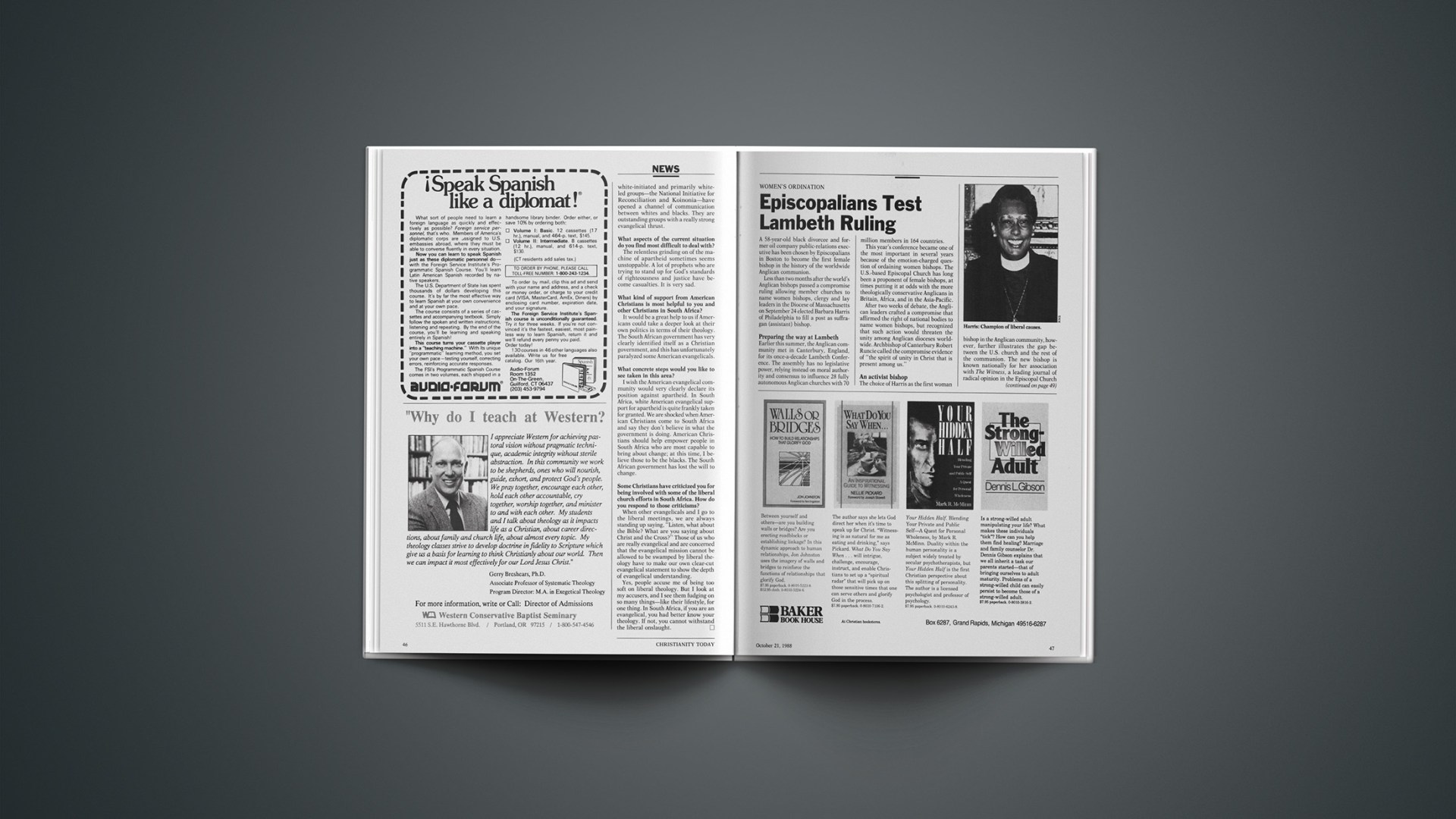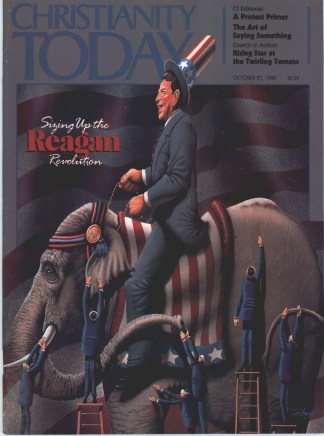WOMEN’S ORDINATION
A 58-year-old black divorcee and former oil company public-relations executive has been chosen by Episcopalians in Boston to become the first female bishop in the history of the worldwide Anglican communion.
Less than two months after the world’s Anglican bishops passed a compromise ruling allowing member churches to name women bishops, clergy and lay leaders in the Diocese of Massachusetts on September 24 elected Barbara Harris of Philadelphia to fill a post as suffragan (assistant) bishop.
Preparing The Way At Lambeth
Earlier this summer, the Anglican community met in Canterbury, England, for its once-a-decade Lambeth Conference. The assembly has no legislative power, relying instead on moral authority and consensus to influence 28 fully autonomous Anglican churches with 70 million members in 164 countries.
This year’s conference became one of the most important in several years because of the emotion-charged question of ordaining women bishops. The U.S.-based Episcopal Church has long been a proponent of female bishops, at times putting it at odds with the more theologically conservative Anglicans in Britain, Africa, and in the Asia-Pacific.
After two weeks of debate, the Anglican leaders crafted a compromise that affirmed the right of national bodies to name women bishops, but recognized that such action would threaten the unity among Anglican dioceses worldwide. Archbishop of Canterbury Robert Runcie called the compromise evidence of “the spirit of unity in Christ that is present among us.”
An Activist Bishop
The choice of Harris as the first woman bishop in the Anglican community, however, further illustrates the gap between the U.S. church and the rest of the communion. The new bishop is known nationally for her association with The Witness, a leading journal of radical opinion in the Episcopal Church that has championed the feminist and gay-rights movements, the Sandinista government of Nicaragua, the antiapartheid struggle, and gender-neutral liturgies. Since 1984, Harris has been executive director of the firm that publishes The Witness and has been a columnist.
She also has a long record as an activist—including work in the South for black rights in the 1960s—and is known as a powerful preacher. Ordained as a priest eight years ago, after leaving Sun Oil Company, she has been a Philadelphia prison chaplain and has served small congregations in Morristown and Philadelphia, where she currently is priest-in-charge at the Church of the Advocate. That parish is where the battle over women priests was dramatized in 1974 with the ordination of eleven women by retired bishops acting in defiance of local and national church canons. Harris took part in that service and was ordained four years after the Episcopal Church legalized women priests.
Harris told her congregation the election to the post of bishop is a sign of “fresh winds blowing across the church,” and she compared the movement for women clergy to Jesse Jackson’s Rainbow Coalition because it gives “new hope” to many who feel ignored and alienated from the Episcopal Church.
Rough Sailing?
But a storm is already brewing over the election. Bishop of London Graham Leonard, a leading traditionalist, declared he would consider himself out of communion with Harris and those who consecrate her, and said he would not recognize her power to ordain other clergy or administer the sacrament of confirmation. And the Vatican released a statement saying the election of Harris makes Anglican-Roman Catholic unity even more difficult.
John Throop, director of the conservative group Episcopalians United, said he personally had no problem with the principle of women in the episcopate, but, he declared, “As a bishop, Ms. Harris will make the Episcopal Church more polarized and politicized than it already is. I think she will be a dangerous influence … she is about as far to the Left as they come in the Episcopal Church, and I don’t think it’s wise that people like that are chosen as guardians and shepherds of the faith.”
But Archbishop of Canterbury Runcie appealed for restraint, saying, “It is not for individuals to make declarations about whether they are in or out of communion with her or the Episcopal Church. Such a matter is determined by the processes of the church, not by private judgment.…”
By Richard Walker.
World Scene
DISASTER
Gilbert Slams Salvation Army
The Salvation Army is usually the first group on the scene of national disasters. But during Hurricane Gilbert’s mad dash through the Caribbean, the army’s territorial headquarters in Jamaica was part of the scene of destruction.
The strong winds of Gilbert, which caused $40 billion worth of damage in Jamaica, toppled the Salvation Army headquarters building in Kingston, along with a school for the blind, two children’s homes, and at least one living quarters for officers. Estimates indicate 70 percent of Salvation Army property was leveled.
Lt. Col. Leon R. Ferraez, a spokesman for the army, said several commercial airlines helped fly in emergency supplies from Atlanta and Miami shortly after the Jamaica airport reopened. Despite the loss of facilities, Salvation Army officers and volunteers provided food, medical aid, and building supplies to Jamaicans.
As the hurricane moved westward, more than 20 Salvation Army emergency shelters were activated in the Gulf of Mexico region. In Jamaica alone, more than one-fourth of the population has been left homeless.
WORLD EVANGELIZATION
“Re-Evangelizing” Europe
Most American evangelicals trace their spiritual roots to movements begun in Europe. So it was with a bit of irony that the Lausanne Committee for World Evangelization (LCWE) held a conference last month in Stuttgart, West Germany, to plan the “re-evangelization” of Europe.
According to Rolf Scheffbuch, chairman of the European branch of LCWE, re-evangelization’s goal is not new members for existing churches, but a “repentance movement” within the Protestant church. He said the great number of nominal church members in Europe must no longer be “religious actors,” but “active Christians.”
Thomas Wang, international director of LCWE, challenged church leaders to overcome their “euro-pessimism,” and British author John Stott stressed the need for the church in Europe to address social issues such as unemployment and poverty.
Nearly 140 theologians and church leaders from 21 East and West European countries attended the conference.
MEDICAL ETHICS
Home Abortions Approved
China and France recently approved the marketing of a new drug that induces abortion, and an American company may seek permission to market the drug in the U.S.
Family planning experts say the drug, RU 486, is safer and less expensive than surgical abortions. They also predict the use of the drug will replace up to half the surgical abortions in France.
According to Louise B. Tyrer of the Planned Parenthood Federation of America, the drug will be administered in France at family-planning centers. She stressed it is not a “morning after” type of contraceptive, but is to be used only after pregnancy is confirmed. A woman would take the drug for three consecutive days, after which a miscarriage would take place.
Richard Glasgow, education director of National Right to Life in Washington, D.C., said his group would encourage antiabortion groups in France to protest the marketing of RU 486. Little is known about plans for using it in China.
SOVIET UNION
Pitching Perestroika
The romance between church and state in the Soviet Union produced another surprise last month. Konstantin Karchev, chairman of the government’s Council of Religious Affairs, paid an impromptu visit to the Ecumenical Centre in Geneva, Switzerland. The center is headquarters for the World Council of Churches, the World Alliance of Reformed Churches, the Lutheran World Federation, and the Conference of European Churches.
Karchev used the occasion to pitch perestroika (restructuring) and glasnost (openness), twin pillars of Communist party chief Gorbachev’s efforts to nudge his country into the twentieth century. He told church leaders new legislation on freedom of religion will eliminate many restrictions imposed on the church, noting that “in many cases,” they have been lifted in practice.
Although Karchev admitted “full communism” means an end to religion, he said such a day is a long way off—echoing sentiments from many Western observers who say Soviet openness to religion is temporary.
VIETNAM
Last Chaplains Released
The last remaining evangelical military chaplains imprisoned by the Communist Vietnamese government in 1975 have been released, according to a report from Keston College, a group monitoring religious freedom in communist countries.
One of the final chaplains to be released, Duong Ky, was the chief evangelical military chaplain of the old pre-1975 Saigon regime. He had been held in a re-education camp since his arrest in 1975, and is reported to be quite ill.
Over the past few years, Vietnamese authorities have released 15 other evangelical pastors. Many of those released had been in custody since 1975.
Nguyen Quang Huy, head of Vietnam’s State Commission for Religious Affairs, told a reporter from a British newspaper, The Independent, that authorities had released all Roman Catholic military chaplains, but have forbidden them to conduct religious services.










